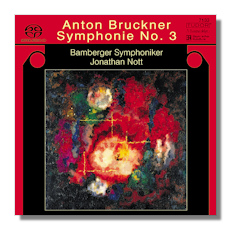
The Internet's Premier Classical Music Source
Related Links
- Bruckner Reviews
- Latest Reviews
- More Reviews
-
By Composer
-
Collections
DVD & Blu-ray
Books
Concert Reviews
Articles/Interviews
Software
Audio
Search Amazon
Recommended Links
Site News
 SACD Review
SACD Review
Anton Bruckner

Third Symphony "Wagner"
- Symphony #3 in D minor (1873 - Nowak)
Bamberg Symphony Orchestra/Jonathan Nott
Tudor 7133 63:12 Hybrid Multichannel SACD
Not that he cares, probably, but Jonathan Nott is quickly becoming one of my favorite conductors. Born in England, he trained as a singer and a flutist at the Royal Northern College of Music, studied conducting in London, and developed his skills as a conductor by rising through the ranks of several German orchestras. Currently, he has a contract as principal conductor of the Bamberg Symphony Orchestra, the ensemble he leads here. This recording dates from 2003. I think a CD version has been available for at least a few years, but what I am reviewing here is an SACD.
Most conductors have recorded a revised version of Bruckner's Third – usually the one from 1889 and published by Nowak. Nott is one of the few conductors (others include Inbal and Tintner) to go back to the 1873 version – the same one that he showed to an enthusiastic Richard Wagner, and the one that was premièred (disastrously) in Vienna in 1877. Many commentators have complained that this version is tedious, and that revisions did the symphony more good than harm. Nevertheless, on this disc Nott makes an excellent case for the 1873 version, which is indeed appreciably longer than those that followed it. Bruckner's original thoughts are quite striking, and show what a forward-looking composer he was. Hearing this version of the Third, one hears from where the Ninth Symphony came.
Nott doesn't attempt to gloss over the Third's more idiosyncratic or, if you will, risky passages. Instead, he conducts them with conviction, and with no excuses at all. What in less committed hands could have sounded like note-spinning becomes a compelling and typically Brucknerian developmental process. The outer movements are monumental in scope, the long Adagio (17:50 here) transcendent yet warmly human, and the Scherzo as exciting and as incipiently demonic (in the outer sections, anyway), as the analogous movement of the Ninth Symphony. Nott has a firm grip on where he is going at all times, and interest never is allowed to flag. The Bambergers play wondrously, and the brass truly earn their pay here. The orchestral sound is well-blended but not bland, and bright but not brash. A SACD player adds to the visceral experience, but even without one, one can't help noticing how good this disc sounds. This is music that people with good stereo equipment can use to show off their toys, yet Bruckner doesn't leave one feeling guilty, or hungering for something more substantial.
Particularly if they have not heard the 1873 version of this symphony, by no means should Brucknerians fail to hear this CD. Even the unconverted will get pleasure from it!
Copyright © 2009, Raymond Tuttle




















